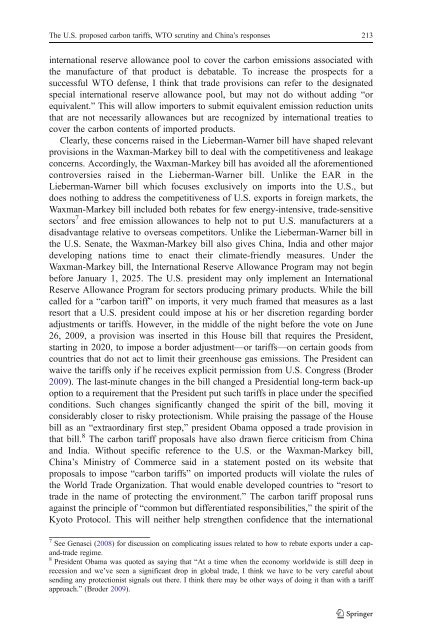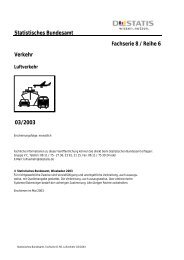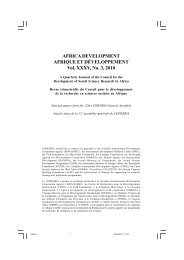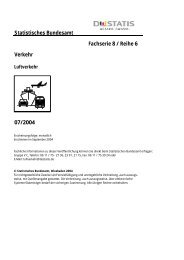The international economics of resources and resource ... - Index of
The international economics of resources and resource ... - Index of
The international economics of resources and resource ... - Index of
Create successful ePaper yourself
Turn your PDF publications into a flip-book with our unique Google optimized e-Paper software.
<strong>The</strong> U.S. proposed carbon tariffs, WTO scrutiny <strong>and</strong> China’s responses 213<br />
<strong>international</strong> reserve allowance pool to cover the carbon emissions associated with<br />
the manufacture <strong>of</strong> that product is debatable. To increase the prospects for a<br />
successful WTO defense, I think that trade provisions can refer to the designated<br />
special <strong>international</strong> reserve allowance pool, but may not do without adding “or<br />
equivalent.” This will allow importers to submit equivalent emission reduction units<br />
that are not necessarily allowances but are recognized by <strong>international</strong> treaties to<br />
cover the carbon contents <strong>of</strong> imported products.<br />
Clearly, these concerns raised in the Lieberman-Warner bill have shaped relevant<br />
provisions in the Waxman-Markey bill to deal with the competitiveness <strong>and</strong> leakage<br />
concerns. Accordingly, the Waxman-Markey bill has avoided all the aforementioned<br />
controversies raised in the Lieberman-Warner bill. Unlike the EAR in the<br />
Lieberman-Warner bill which focuses exclusively on imports into the U.S., but<br />
does nothing to address the competitiveness <strong>of</strong> U.S. exports in foreign markets, the<br />
Waxman-Markey bill included both rebates for few energy-intensive, trade-sensitive<br />
sectors 7 <strong>and</strong> free emission allowances to help not to put U.S. manufacturers at a<br />
disadvantage relative to overseas competitors. Unlike the Lieberman-Warner bill in<br />
the U.S. Senate, the Waxman-Markey bill also gives China, India <strong>and</strong> other major<br />
developing nations time to enact their climate-friendly measures. Under the<br />
Waxman-Markey bill, the International Reserve Allowance Program may not begin<br />
before January 1, 2025. <strong>The</strong> U.S. president may only implement an International<br />
Reserve Allowance Program for sectors producing primary products. While the bill<br />
called for a “carbon tariff” on imports, it very much framed that measures as a last<br />
resort that a U.S. president could impose at his or her discretion regarding border<br />
adjustments or tariffs. However, in the middle <strong>of</strong> the night before the vote on June<br />
26, 2009, a provision was inserted in this House bill that requires the President,<br />
starting in 2020, to impose a border adjustment—or tariffs—on certain goods from<br />
countries that do not act to limit their greenhouse gas emissions. <strong>The</strong> President can<br />
waive the tariffs only if he receives explicit permission from U.S. Congress (Broder<br />
2009). <strong>The</strong> last-minute changes in the bill changed a Presidential long-term back-up<br />
option to a requirement that the President put such tariffs in place under the specified<br />
conditions. Such changes significantly changed the spirit <strong>of</strong> the bill, moving it<br />
considerably closer to risky protectionism. While praising the passage <strong>of</strong> the House<br />
bill as an “extraordinary first step,” president Obama opposed a trade provision in<br />
that bill. 8 <strong>The</strong> carbon tariff proposals have also drawn fierce criticism from China<br />
<strong>and</strong> India. Without specific reference to the U.S. or the Waxman-Markey bill,<br />
China’s Ministry <strong>of</strong> Commerce said in a statement posted on its website that<br />
proposals to impose “carbon tariffs” on imported products will violate the rules <strong>of</strong><br />
the World Trade Organization. That would enable developed countries to “resort to<br />
trade in the name <strong>of</strong> protecting the environment.” <strong>The</strong> carbon tariff proposal runs<br />
against the principle <strong>of</strong> “common but differentiated responsibilities,” the spirit <strong>of</strong> the<br />
Kyoto Protocol. This will neither help strengthen confidence that the <strong>international</strong><br />
7<br />
See Genasci (2008) for discussion on complicating issues related to how to rebate exports under a cap<strong>and</strong>-trade<br />
regime.<br />
8<br />
President Obama was quoted as saying that “At a time when the economy worldwide is still deep in<br />
recession <strong>and</strong> we’ve seen a significant drop in global trade, I think we have to be very careful about<br />
sending any protectionist signals out there. I think there may be other ways <strong>of</strong> doing it than with a tariff<br />
approach.” (Broder 2009).








